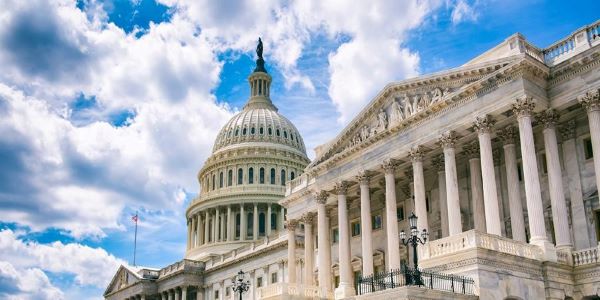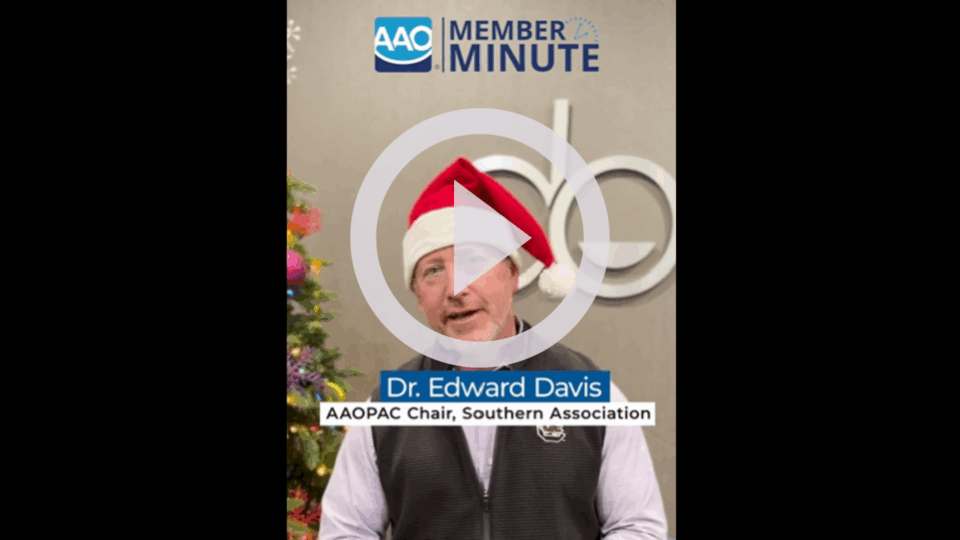The following updates for AAO members have been provided to the Advocacy team by our AAO lobbying representative based in Washington, D.C., Cozen O’Connor Public Strategies.
While the AAO continues to proactively advocate for our evidence-based priorities in Washington, D.C. — including recent delegation meetings with the U.S. Food and Drug Administration and on Capitol Hill — ongoing Congressional gridlock is creating challenges and uncertainty that impact many Americans. Learn more about these issues and other timely updates below.
Government Shutdown Continues (as of November 7)
It is day 38 of the government shutdown, and earlier this week it became the longest shutdown in U.S. history. Congress remains at an impasse. Senate Republicans are continuing to push for a clean continuing resolution (CR) to reopen the government while Senate Democrats are demanding that Congress extend the enhanced ACA premium tax credits as part of the funding deal. President Trump has publicly expressed that he would wait to consider proposals to extend these tax credits until after the federal government reopens.
House Speaker Mike Johnson (R-LA) has made clear the House will remain adjourned until the Senate acts to fund the government. That position may become more difficult to maintain as we approach November 21, the date the continuing resolution already passed by the House would fund the government through.
As November 21 approaches, Congress will need to rework the funding package to reopen the federal government, including changing how long the CR would last (or even pursue a new spending bill for fiscal year 2026). A small bipartisan group of Senators seems to be having some productive conversations in the past few days about what a possible deal to reopen the government would look like.
There are two key challenges that policymakers are bracing for as the government shutdown continues. First, Supplemental Nutrition Assistance Program (SNAP) benefits expired on November 1. While a federal court has directed the Trump administration to continue paying out SNAP benefits via a contingency fund, the Trump administration has stated that SNAP benefit payouts would be reduced and delayed.
Second, Vice President J.D. Vance and U.S. Secretary of Transportation Sean Duffy have warned that the continuation of a government shutdown could result in significant travel delays. They regularly highlight that air traffic controllers are going unpaid during the government shutdown, which is leading many air traffic controllers to skip work. Moreover, Secretary Duffy has recently warned the continuation of government shutdown might force the FAA to shut down some airspace.
Both challenges have amped up pressure on Congress and the White House to strike a government funding deal, especially with Thanksgiving travel a few weeks away.
The government funding situation is fluid due to a number of factors, including the off-year elections this week in Virginia, New Jersey, and New York City. Many politicians have been hesitant to come to the table thus far based on the view that their actions could affect these elections. There may be more room for negotiations with these elections behind us, and we have yet to see how Democratic wins in all three states may influence the negotiating posture of Republican and Democratic leadership.
On Wednesday morning in a closed-door meeting, President Trump told Republican Senators that the GOP would become a “dead party” if they do not eliminate the legislative filibuster and also told them that they should view the election results from Tuesday as a sign that Republicans are “getting killed” in the fight around the shutdown.
Public Service Loan Forgiveness Rule Changes
On October 30, the U.S. Department of Education issued a final rule revising the Public Service Loan Forgiveness (PSLF) program to clarify which employers qualify for participation. The rule amends the definition of a “qualifying employer” to exclude organizations that engage in unlawful activities deemed to have a substantial illegal purpose, such as supporting terrorism or aiding illegal immigration.
This action follows President Trump’s March 2025 executive order directing the Department to ensure that PSLF benefits are limited to organizations that lawfully serve the public. The final rule is scheduled to take effect on July 1, 2026. Multiple states’ Attorneys General and non-profits have filed suit against the administration over this rule.
U.S. Surgeon General Nomination Postponed
On October 30, the Senate HELP Committee postponed its confirmation hearing for President Donald Trump’s nominee for Surgeon General, Dr. Casey Means, after the nominee went into labor with her first child. Dr. Means, a Stanford-trained physician and best-selling author, would have been the first nominee to appear virtually before the committee due to her pregnancy.
Nominated in May following the withdrawal of Dr. Janette Nesheiwat, Dr. Means is known for advocating holistic health approaches emphasizing nutrition, exercise, and reduced reliance on pharmaceuticals. It is not yet known when the confirmation hearing will be rescheduled.
CMS Chief Dental Officer Resigns
We learned this week that Dr. Natalia Chalmers, who has been a great friend to the AAO, has chosen to leave her role as the Chief Dental Officer at the Centers for Medicare and Medicaid Services for a new opportunity. Dr. Chalmers will soon announce her next steps, but they will involve continuing to advance national oral health in a way that builds on her commitment to the overall health of children, adults, and seniors.


